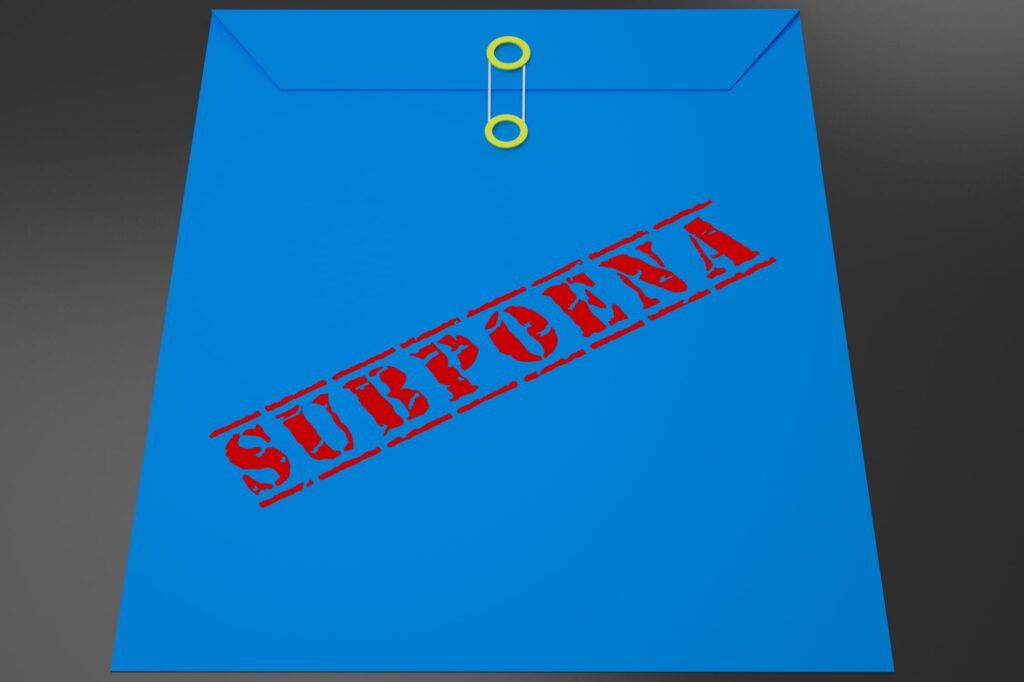What Types of Papers Do Process Servers Serve?
A process server is empowered to serve certain documents to defendants and other named parties in legal actions. Understanding the duties and functions of this important position can help you determine if you could outsource certain tasks to a process server.
Process servers are versatile in their professional roles. They can serve various types of papers, as long as their service is protected by state law.
When you understand the kinds of papers that a process server can serve, you can make more informed decisions about how to run your legal operations more smoothly and efficiently.

What kind of papers does a process server serve?
Process servers are vital for many legal proceedings, as they deliver essential legal documents such as subpoenas, complaints, and eviction notices, among others. Knowing what a process server does and what papers they serve helps ensure your legal case proceeds efficiently.
Let’s break down the standard types of legal documents that servers can hand off to individuals who have been named in lawsuits and other legal proceedings. Although this is not a comprehensive list, it gives you a good overview of the variety of papers a process server can serve.
Subpoenas
A subpoena is a formal order, issued by the courts, that requires an individual to appear before the court to testify or produce certain documents. Sometimes, they are issued by other government agencies.
Process servers frequently deliver subpoenas due to their legal significance and the need for verified delivery.
Common cases when process servers serve subpoenas include:
- Witness testimony in a civil litigation case involving a car accident.
- Requesting financial records in a corporate fraud investigation.
- Demanding electronic communications or emails in an employment dispute.
These notices cannot be ignored or disregarded by the recipient, as failure to appear is considered contempt of court. When someone ignores a subpoena, they face legal consequences.
Depending on the circumstances of the case and the rules of the state, subpoenas may be served through the mail or via email. However, process servers often find themselves serving subpoenas, as the courts benefit from the documentation that servers perform as part of their job duties. Recording the service of process provides the courts with evidence that the subpoena was received.

Summons
Like a subpoena, a summons is an official notice to an individual by the court. However, that notice is for a completely different purpose. While a subpoena tells someone to appear in court, a summons notifies them that they have been named as the defendant in a lawsuit.
The courts may issue a summons in multiple scenarios, including:
- Civil cases
- Criminal cases
- Small claims court
Summonses are some of the most commonly served legal documents by process servers.
Typical scenarios include:
- Notifying a defendant in a personal injury claim.
- Issuing a court date for a breach of contract case.
- Summoning a person for a misdemeanor offense as an alternative to arrest.
In some criminal cases, such as a misdemeanor case, a summons can be used as an alternative to an arrest warrant.
A summons must be issued far enough in advance of the legal case to give the defendant time to prepare for the case.
Complaints
A legal complaint is a written document that outlines the facts of a complainant’s claim.
Practical examples that process servers usually serve include:
- A tenant filing a complaint against a landlord for unsafe living conditions.
- A business suing another for trademark infringement.
- A consumer filing a complaint over a defective product that caused injury.
This document kickstarts the lawsuit by detailing the following:
- How the complainant’s rights were violated
- The complainant’s demands of the accused
The complaint, which can vary significantly in length, may be issued at the same time as the summons, but these are two different documents.
Divorce Petitions
Because divorce proceedings can be contentious, many lawyers recommend using a process server to deliver the divorce petitions. This is especially important in cases where a no-contact order has been issued and the two parties are not allowed to be in each other’s presence.
Common situations where process servers serve divorce petitions include:
- One spouse is living out of state or avoiding communication.
- A case involving domestic violence with a no-contact order.
- A high-conflict divorce with disputes over asset division or custody.
Given the personal nature of these cases, using a process server in a divorce case ensures neutral, safe delivery.
Child Custody Orders
When custody is disputed, a judge finalizes a child custody order, which determines how guardianship will be divided by the parents. This document provides explicit instructions regarding who has custody of the child, when they have custody, and any rules related to the child’s welfare.
A process server may serve these orders if they are not served in the courtroom. This is especially common when non-custodial parents need to be informed of changes in their parenting plan because they failed to attend the court proceedings.
Examples of when a process server serves such orders:
- When a parent fails to appear in court, and must be notified of a new custody schedule.
- During modifications to an existing custody agreement due to a parent’s relocation.
- When the court assigns temporary custody during an emergency.
Prohibited Steps Orders
When the court acts to end a guardian’s custody of a child due to negligence, abuse, or abandonment, a judge will dictate a prohibited steps order. This means that a representative of the court is legally empowered to remove the child from that person’s custody.
Commonly, the legal documents process servers serve in these situations are necessary when:
- Preventing one parent from taking a child abroad without consent.
- Removing custody from a guardian due to substantiated neglect or abuse.
- Blocking a parent from changing a child’s school or medical care provider without court approval.
Eviction Notices
Landlords and property owners who need to evict a tenant must follow their state’s requirements for eviction. This always includes some form of written eviction notice, which is served by a process server. The eviction notice informs anyone who is occupying the property that they must vacate the premises by a specific date.
Situations where process servers serve eviction notices include some of the following:
- A tenant repeatedly fails to pay rent on time.
- Violation of lease terms, such as keeping unauthorized pets.
- Use of the rental property for illegal activities, like drug-related offenses.
Statutory Demands
When a debtor fails to meet certain debt requirements or fails to meet deadlines, their creditors can make statutory demands in the form of a served written document. This proves to the court that the debtor was informed of their obligations and failure to meet them.
Process servers serve statutory demands in one or more of the following scenarios:
- A creditor issuing a demand after a business defaults on a loan.
- Repeated non-payment of commercial invoices by a client.
- A former partner or investor failing to repay a settlement agreement.
Protective Orders and Restraining Orders
Victims of harassment, assault, stalking, and other offenses may be granted a protective and/or restraining order from the person who intends to cause them harm. This is one of the ways that a court can prohibit an alleged abuser from intimidating, harming, contacting, or approaching their victim. A protective order will spell out exactly what kind of contact is and is not allowed.
A restraining order is a broader category that can also apply to relationships like neighbors, coworkers, and other individuals.
For both protective and restraining orders, the victim must file a petition with the court. These orders are usually issued quickly, and a process server must move quickly to inform the named party that they are prohibited from contacting the complainant.
Typical use cases when process servers serve the legal documents in question include:
- A victim of domestic violence filing for a protective order.
- A restraining order to prevent workplace harassment by a former employee.
- Protection for a person being stalked or threatened by a neighbor or acquaintance.
Writs of Execution
After a court case is won and a monetary judgment is issued, the plaintiff must still collect the funds from the losing party (the debtor). If the debtor doesn’t pay willingly, the court can issue a writ of execution. This document authorizes a sheriff or process server to enforce the judgment by seizing the debtor’s assets.
Serving a writ of execution is a critical step in turning a court judgment into an actual financial recovery.
Common scenarios for serving a writ of execution by a process server include:
- Bank levies: Serving the writ to a bank to freeze and seize funds from the debtor’s account.
- Wage garnishments: Notifying an employer that they must withhold a part of the debtor’s wages to pay the judgment.
- Property seizures: In some cases, seizing personal property to be sold to satisfy the debt.

The importance of finding a qualified process server
Legal proceedings depend on precision, compliance, and timely delivery of court documents. Therefore, choosing a qualified process server is a legal necessity. The success of your case often begins with ensuring that legal documents are served accurately, lawfully, and on time. Whether you’re initiating a civil lawsuit, serving a subpoena, or issuing a divorce petition, the role of a certified process server is critical.
Legal cases are built on a foundation of accuracy. In fact, you can’t win a case without prioritizing accuracy from day one. That’s one of the reasons why you need to choose a process server who pays meticulous attention to detail and performs service of process with excellence and professionalism.
Firefly Legal works with process servers nationwide, and we only contract with knowledgeable and experienced servers. Our network includes only experienced and well-trained individuals who understand both the technical and legal aspects of service of process.
A good process server will:
- Serve documents in a way that upholds the due process rights of individuals
- Keep your cases moving forward
- Serve papers quickly
- Perform skip tracing for difficult-to-find defendants
- Always confirm the identity of the individuals they are serving
- Utilize technology to make the process more efficient
- Perform additional legal services as needed, including court filing
Instead of trying to find a process server on your own, partner with us at Firefly Legal. We can connect you with process servers who understand the intricacies of process serving and who prioritize both accuracy and professionalism. Hiring an unqualified or inexperienced process server can result in delays, case dismissals, or even violations of legal procedure. Don’t leave your case to chance. We understand the nuances of process serving and are committed to helping attorneys, law firms, and businesses manage their cases smoothly and efficiently.
The Critical Role of the Affidavit of Service for Process Servers and the Legal System
Once a process server successfully delivers the legal documents, their most important task is still ahead: preparing and filing the affidavit of service, also known as the proof of service. This is a sworn statement filed with the court that formally attests that the service of process was completed according to law.
This legal document is the cornerstone of jurisdiction and includes vital details, such as:
- The date, time, and specific location where service occurred.
- The name of the individual who was served.
- A description of the documents that were delivered.
- The method of service used (e.g., personal delivery, substituted service).
- The process server’s licensed or registered name and signature.
Without a properly executed affidavit of service, a defendant could claim they were never notified of the legal action. This could lead to the court delaying the case or even dismissing it entirely for improper service. A professional process server ensures this document is accurate, timely, and correctly filed, thereby protecting the integrity of the case and upholding every party’s right to due process.
Legal Documents Serving and Process Servers: Frequently Asked Questions
Can process servers serve divorce papers?
Yes, process servers can serve divorce papers, including the petition for divorce. This is particularly helpful in cases where spouses are unable to communicate or have no-contact orders in place. Using a process server ensures that the divorce process begins legally and smoothly.
What are child custody orders, and how are they served?
A child custody order outlines how custody is shared between parents and establishes guidelines for guardianship. If a parent is not present during court proceedings, process servers deliver these orders to ensure that all parties understand their legal obligations.
What is an eviction notice, and who serves it?
An eviction notice is a document that informs tenants they must vacate the premises by a specific date due to lease violations or non-payment of rent. Process servers deliver these notices, ensuring that landlords comply with state laws in the eviction process.
Can process servers deliver protective and restraining orders?
Yes, process servers are authorized to deliver protective and restraining orders, often on an expedited basis. These orders are critical in situations involving harassment, abuse, or stalking, and timely service ensures the safety of the victim by formally notifying the named party of the restrictions.
Contact Firefly Legal today to learn more about how you can tap into our nationwide network of process servers! No matter your needs, Firefly Legal can handle it!







